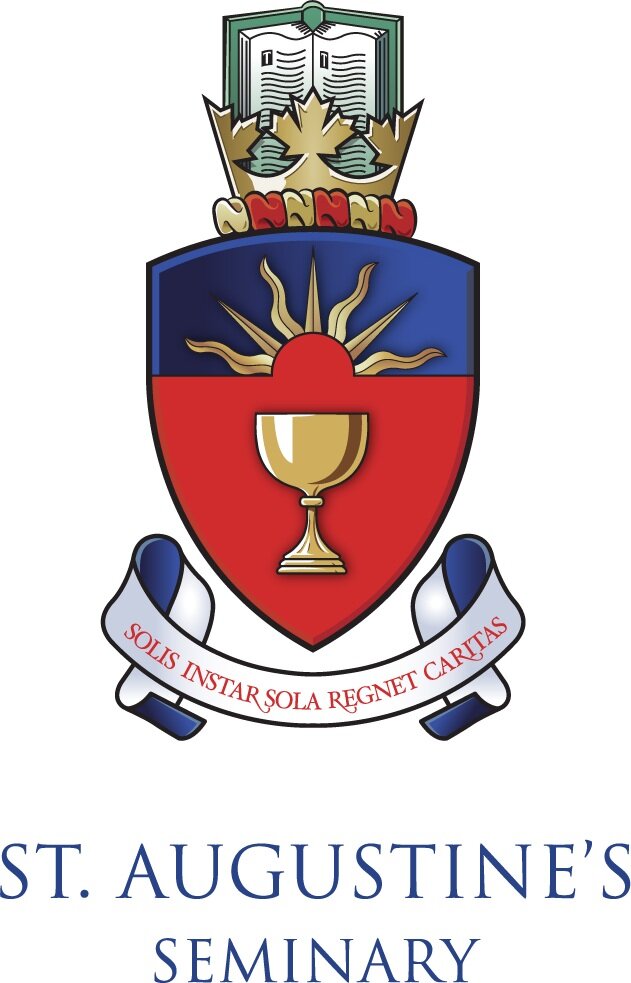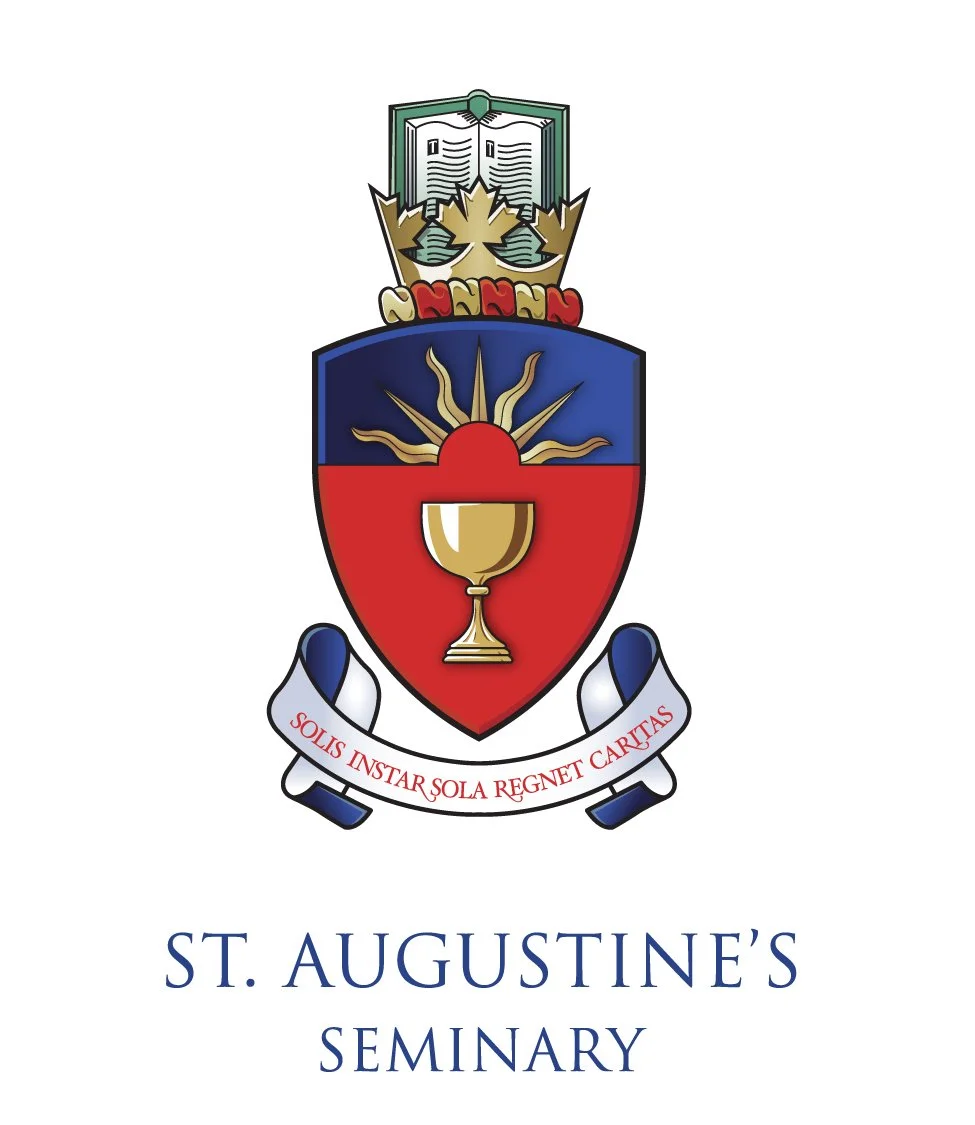Master of Divinity (M.Div.)
The core curriculum of this program is designed to give a sound theological education in preparation for ministry, incorporating pastoral formation that is achieved chiefly through Field Education.
Overall Goal: The Master of Divinity program at St. Augustine’s Seminary prepares candidates for ordained priesthood and lay women and men aspiring to ministry in the Catholic Church.
Program Outcomes
Religious Heritage: Demonstrate foundational and comprehensive knowledge of the biblical, systematic, moral, pastoral, spiritual, and historical dimensions of the Catholic theological tradition, especially in its official teaching.
Personal and Spiritual Formation: Demonstrate integration of human, spiritual, and vocational growth with knowledge of the Catholic theological tradition, as evidence of an integrated and personal response of love of and witness to Jesus Christ, and of readiness to serve the Church with mature virtue and integrity.
Cultural Context: Demonstrate, in the spirit of the new evangelization, an ability to draw on and communicate the Catholic theological tradition to engage critically and charitably with contemporary theological trends, technological developments, and diverse global and cultural contexts.
Religious and Public Leadership: Demonstrate mature pastoral and leadership skill, with charity and good judgment, as evidence of a disposition of communion and servant leadership in the service of the Church’s public worship, witness, and care of souls.
Admission Requirements
Bachelor's degree, preferably a Bachelor of Arts (B.A.), or its equivalent with adequate standing (normally at least B- standing in their final year) from an accredited institution.
The Seminary requires this academic preparation in view of the demand of the Second Vatican Council that candidates be suitably grounded in the humanities. With respect to this, the Canadian Conference of Catholic Bishop (C.C.C.B.) expressed the view that "we do not think that this requirement can be fully met by one who does not hold a university degree or its equivalent" (Program of Priestly Formation, Ottawa, C.C.C.B., 1979, n.36). In accord with the Bishops, St. Augustine's makes this degree a pre-requisite to theological studies. Students with a non-humanities degree such as a Bachelor of Business Administration or Bachelor of Engineering may not have sufficient preparation in the humanities and may be required to take appropriate additional courses. Such cases will be judged on an individual basis.
Philosophy Requirement: 10 one-semester courses
The Academic Dean and Registrar are available to guide students who are attempting to meet the philosophy requirement while attending another institution. The institution’s name, course designator, faculty, or department offering the course and complete course description may be forwarded to the Registrar for consultation.
For admission to studies, there is a requirement of a minimum of ten one-semester courses in Philosophy. The courses shall be: Ancient Philosophy, Logic and the Philosophy of Language, Philosophical Anthropology, Philosophy of Nature and Natural Theology, Modern Philosophy, Contemporary Philosophy, Medieval/Scholastic Philosophy, Metaphysics, Epistemology/Philosophy of Knowledge, Moral and Political Philosophy, without exception. The minimal acceptable grade for philosophy courses that are to be counted towards the above philosophy requirement is normally a 60% equivalent.
Those lacking four or fewer courses of the completed Philosophy requirements may simultaneously take courses in this area early in their theological studies. The Admissions Committee normally requires that a full load of theological courses be postponed until the philosophical requirements have been met.
Philosophy Prerequisites - Alternative Completion Options
For students who have not met the minimum philosophy requirements, the following options are available:
1. St. Augustine’s Seminary Ecclesiastical Faculty Program Diploma in Philosophy program. This program can be completed through in-person or online modality.
2. Through coursework at other institutions
Students should consult with the St. Augustine's Seminary Registrar to ensure course selections meet requirements.
Customized Program
For candidates in the Priestly Formation Program who have completed some philosophy credits, the Academic Administration can design a tailored program to complete the remaining requirements.
Students in the categories noted above need to consult the Academic Dean about the fulfillment of their philosophy requirements.
It is the student's responsibility to be familiar with St. Augustine's Seminary philosophy requirements and to ensure that all forms are forwarded to the Registrar to maintain the completeness of their academic file.
English language proficiency.
As a requirement of our pre-theology program, all seminarian STB/Miv. program applicants will be tested for proficiency with the English language. This includes seminarians preparing for diocesan ministry, seminarians seeking admission to the Redemptorist Mater Missionary Seminary, and members of other religious orders. Students will be tested using two assessment tools: Survey of English Grammar and an Essay Writing Evaluation. A passing grade of 62% is required for the Survey of English Grammar and a pass for the Essay Writing Evaluation. Both tests take place in-person, the first week of September. Candidates will be notified if their grades indicate that they will be participating in the English Seminar for two terms at no extra cost. Our students do not have access to the University of Toronto’s student success services, including their writing centre; therefore, the seminary is providing this service to all eligible students. The course gives our students an opportunity to improve their writing and communication skills.
For the other SAS degrees, SAS follows the TST requirement for international students who have not completed a previous degree in English:
“All applicants are expected to have developed to a satisfactory degree the ability to understand spoken and written English and to be able to communicate effectively in this language. If there is any doubt concerning an incoming student’s competence in English, his/her facility will be tested in the areas of speaking, listening, reading, and writing prior to admission.”
Details of testing requirements are listed in the Toronto School of Theology Basic Degree Handbook, section 5.4 English Language Facility, including more detail regarding testing for students who are new to Canada and whose mother tongue is not English. Students who are new to Canada are encouraged and helped to seek opportunities to become more familiar with the Canadian cultural context.
Formation Program.
Applicants for the S.T.B./M.Div. degree programs ordinarily are sponsored by a Diocese or provide supporting documentation [a letter of recommendation from their bishop or ecclesiastical superior] of participation in a spiritual formation program of a religious congregation or a recognized ecclesial lay movement.
The Academic Dean will interview all other applicants. Please note: Due to link between S.T.B./M.Div. and preparation for ministry, withdrawal from formation does not guarantee continuation in the S.T.B. /M.Div. degree program.
M.Div. Core Curriculum
There are thirty required courses including the Integration of Theological Areas. In addition to the thirty courses, the pastoral formation incorporates a course in field education for one semester.
A. Nine Systematic Theology Courses
Foundations of Theology
The Christian God/Mystery of the Trinity
Theological Anthropology I - Creation
Christology
Theological Anthropology II - Grace
Ecclesiology
Sacraments I
Sacraments II
Summative Integrative Course
B. Five Moral Theology (Ethics) Courses
Fundamental Christian Ethics I
Fundamental Christian Ethics II
Social Ethics
Medical Ethics
Ethics of Human Sexuality & Marriage
C. Seven Scripture Courses
1. Old Testament
Historical Books of the Old Testament
Wisdom and Psalms Literature
Prophetic Literature
2. New Testament
Introduction to the New Testament
Pauline Literature
Johannine Literature
Synoptic Gospels
D. Four History Courses
First One Thousand Years Church History
Patristics
Middle Ages – Reformation Church History
Modern Church
E. Five Pastoral Courses
Canon Law
Liturgy
Homiletics
Pastoral Counselling
Pastoral Psychology
Plus Field Education
Honours Master of Divinity
For details of the thesis program, please contact the Registrar.
Hybrid Master of Divinity
This program, offered by all TST colleges, prepares persons for ordained ministry and for responsibilities of general pastoral and religious leadership in congregations and other settings. The minimum requirement for this degree is thirty (30) courses or equivalent units (15 credits), over a three-year period. Students may take a longer time to complete this program, but it is educationally appropriate for the program to be completed within eight calendar years. Colleges may stipulate individual course requirements or a minimum quota of courses from any of the program areas (biblical, historical, pastoral and theological studies), and may require additional courses. Colleges may also require prerequisites, co-requisites, period of residency and competency for ministry work outside of the degree program itself. Individual colleges evaluate a student’s readiness for ministry according to requirements, conditions, and norms prescribed by the college itself.”
Please contact the Registrar for further details.

